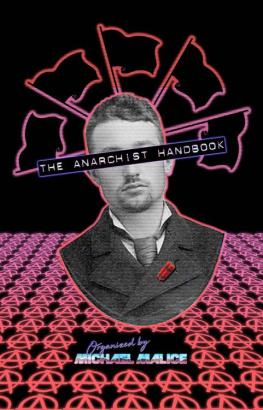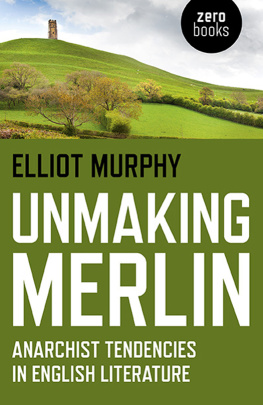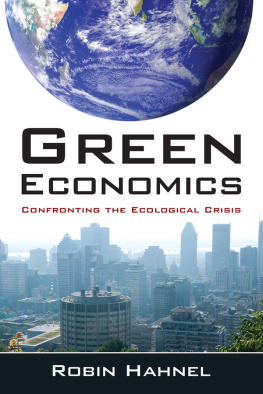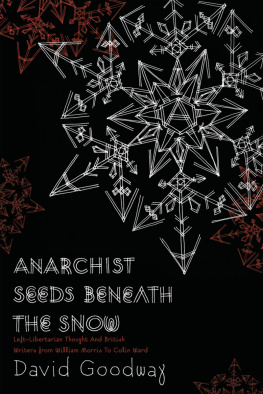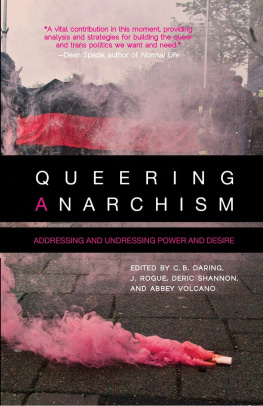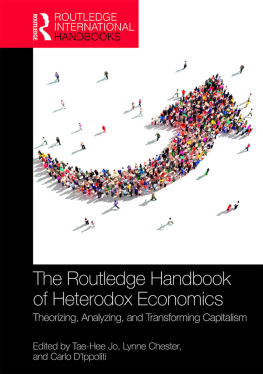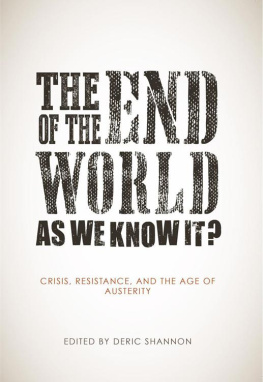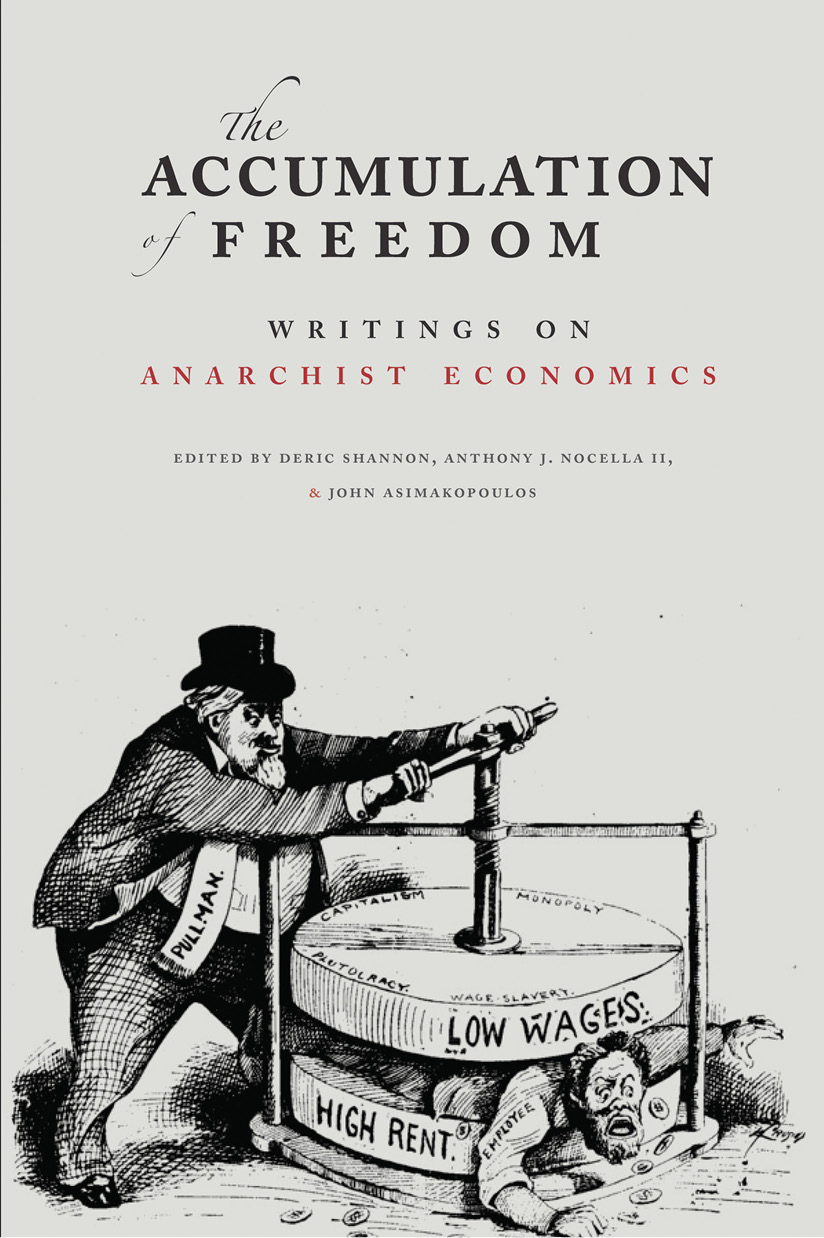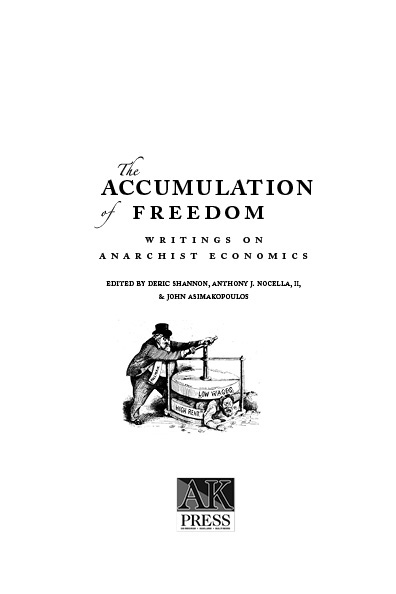Acknowledgments
We would of course like to thank everyone at AK Pressespecially Zach, Charles, Lorna, Jessica, and Katethe contributors, and the many people who have written in support of the book. Without all of you this book would not be possible.
Deric Shannon
Since this book is about anarchist criticisms and alternatives to capitalism , I would like to take the time to thank people who have helped me along in the spirit of mutual aid. Without many of these people I would have gone without food and shelter, without others I would have gone without needed kindness and friendship, and without them all my life would certainly be emptier. First and foremost, thank you to Amney Harper for repeatedly saving my life. I will never forget my debt to you. Secondly, and in no particular order, I would like to thank: Amanda Rose Zody, Jacquelyn Arsenuk, Abbey Volcano, Joe Sutton, Jilly Weiss, Tyler Watkins, David Burns , Liz Burns, Kevin Blue, Andrew Salyer, Kevin McElmurry, E Marino, John Wyatt , Gloria Felts, Courtney Cook, Naitha Bellesis, Ryan Ramsey, Nic Lee, Judi Lee (my bestest), Jesse Lee, Ryan Lash, Andrew Jackson , Josh Young, Maria Yates, Matt Sharp , Brooke, Virgil Carstens (you handsome bastard), Delicia Garcia, Bill Armaline, Abe DeLeon, Lil Jerry (I miss you), Chloe and Sofie, Chris Wendt, Joe Hill, Jessica Forgille, Randy Hull, my brothersRich and Dustin, my mother, father, and grandmother, and a host of others who shall remain unnamed. My apologies to anyone I have forgotten on this long list of people who have helped me out throughout the years.
John Asimakopoulos
I wish to acknowledge the brutal and incompetent nature of my employer who, in the words of the American Arbitration Association, fired me arbitrarily and capriciously. That was the final push to make me the involved, anti-authoritarian activist I am today and foster the birth of the Transformative Studies Institute ( www.transformativestudies.org) to retake academia from the corporate university. Resistance is NOT futile. I got my job back and you can get YOUR lives back too with organized direct action.
Anthony J. Nocella, II
First and foremost I would like to thank my friends Deric and John for this incredibly fun and creative collaboration. You both have been an inspiration to work harder for social justice and peace. Much appreciation to the criminology and sociology students, staff, and faculty at SUNY Cortland and Le Moyne College for their friendship and the projects we have worked on. A special thanks to my advisors Peter Castro, Richard Loder, Mecke Nagel, Piers Beirne, and Micere Githae Mugo for their ongoing support and wisdom. And I am forever grateful to Robert Rubinstein for his amazing friendship, support, and advice since day one at Syracuse University . I would like to thank my family and all the other teachers and professors who always believed in me and never said that I did not belong because of having disabilities. I also want to express my gratitude to everyone involved with the Central New York Peace Studies Consortium, American Friends Service Committee, Political Media Review, Institute for Critical Animal Studies, Save the Kids, and Transformative Studies Institute. I would like to thank my dear friend who I work with day in and day out on everything and who is always there to talk with, Sarat Colling. Finally, I would like to thank my friends in no specific order Steve Best, Richard Kahn, Jeremy, Jay, Brian, Ben Gottschall, Andrew, Heather, Eden, Andy, Bister, Owen, Alma, Cameron Naficy, Shane, Sean, Patrick Hoyt, elana levy, Nick Cooney, Dave Lambon, Jason Bayless, Lisa Kemmerer, Roger Yates, Richard Twine, Richard White, Peter McLaren, Anastasia Yarbrough, Abe DeLeon, Luis Fernandez, Nancy Piscitell, Lisa Mignacca, Barron Boyd, Richard Kendrick, Mecke Nagel, Andrew Fitz-Gibbon, Caroline Kaltefleiter, Ali Zaidi, David Gabbard, Kevin Pieluszczak, Josh Calkins, Liat Ben-Moshe, Bill Armaline, Abbey Willis, Roxanne Dunbar-Ortiz, Ramsey Kanaan, Sean Parson, Ernesto Aguilar, David Rovics, Gregory Martin, Stanley Aronowitz, Ruth Kinna, Jeff Monaghan, Carl Boggs, John Alessio, Julie Andrzejewski, Glenn Rikowski, Mitch Rosenwald, David Graeber, Benjamin Frymer, Richard Van Heertum, Jeff Ferrell, Elsa Karen Marquez-Aponte, Ward Churchill, and Jeff Monson, as well as the 20032004 PARC crew, Syracuse Bicycle, AVP Auburn prison, and everyone at Hillbrook. I love you all!
This book is dedicated to all of the exploited and oppressed people struggling for freedom and dignity. Let us transform society, liberate ourselves, and be free!
To the global working class, may they unite and take what is theirs.
Preface
Ruth Kinna
Economics was once called the dismal science and is still often associated with dry, technical argument and the modeling of preferences based on assumptions of perfect knowledge and rational calculation. The language of economicsinvestment, fiscal stimuli, growth, productive efficiency, bull and bear marketsis quite familiar. And the practical implications of these terms are all too predictable and easily understood, particularly during periods of recession. But to many the content of the subject remains mysteriously abstract and its scope seems narrowly focused. The study of economics is too often limited to the analysis of capitalist markets, the murky dealings of international finance or, as the recent and spectacular collapse of the banks shows, with system failure.
Naturally, there have always been critical voices within the discipline, but it is only recently that the possibility of imagining how economies might work, or be made to work differently, has been stated so emphatically. Since the emergence of the global social justice movement, new lines of inquiry about the assumptions, values, and effects of the global economic system have been opened. The mantra that there is no alternative has been subject to fresh scrutiny. Its counter-claim, that other worlds are possible, has proved to be a powerful rival and is beginning to supplant it. The rise of unregulated movements of capital, the dominating presence of multi-national corporations, and the structuring of free trade to favor the most powerful are no longer regarded as inevitable, unstoppable, or spontaneous features of economic marketsmuch less, desirable. That the global economy is a badly regulated, ill-planned system which has been facilitated by a morally bankrupt and oppressive ideologyneoliberalismis surely now clear.
Some of the most important critiques of the neoliberal dystopia to have appeared since 1999 have been informed by non-anarchist socialist and left-liberal positions. The work of Susan George, Peter Singer, Alex Callinicos, Joseph Stiglitz, and others provides a rich source of inspiration. But the anarchistic nature of the social justice movement and the grassroots actions that it has embraced also provides space for the discussion of explicitly anarchist approaches to economics. Some of this discussion might fill non-anarchists with horror, especially if it is assumed that anarchism stands only for the deregulation of the economy, the privatization of all services, and the rolling back of the state with little regard for issues of equality, participation, and creative flourishing. For most groups within the social justice movement, this brand of right-libertarianism is hardly better, though perhaps less hypocritical, than regulated neoliberalism. Its association with anarchismwhich is fiercely contestedowes much to the influence of Murray Rothbard who described his uncompromising and radical defense of individual rights and free market distributions as anarcho-capitalist. Whether or not his identification with anarchism distorted the tradition, his position hardly exhausts the possibilities for an anarchist economics. On the contrary, anarchism offers a strong and rich heritage of anti-capitalist thinking, and it is these lines of thought which might usefully be revived.



